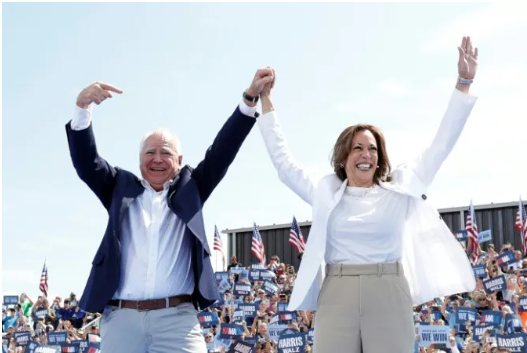
(Photo : dff)
Donald Trump was to campaign Friday in a safe Republican state as Kamala Harris barnstorms the battlegrounds likely to decide November's election, carried by surge in momentum that has left her opponent scrambling.
- Harris' strategy to provoke Trump into viral-worthy statements was successful, with her reactions widely shared.
- Trump's critique of Harris' economic plan resonated with his followers, leading to widespread sharing.
- Despite Trump's larger follower count, Harris' campaign saw more engagement on TikTok, highlighting the role of social media in politics.
In a devastating political event that gripped the nation's pulse, Republican Donald Trump remained defensive throughout as Democratic nominee Kamala Harris engaged to put him in corner with a heated debate. The landmark Presidential debate, which took place on a Tuesday, was not just a battle of words and ideologies on the stage, but also a fierce contest on social media platforms.
As the two political heavyweights sparred, social media users were quick to react, sharing clips and video edits of memorable moments from the debate.
The moment when Harris walked across the stage to shake Trump's hand and introduce herself was particularly seized upon by Democrats. One social media user, Adam James Smith, humorously commented," Kamala said you're gonna shake my hand dammit!". This post alone garnered 40,000 likes, indicating the high level of engagement from the public.
Strategies and Reactions
Harris' strategy for the debate was clear and well-executed. Her advisers had revealed that she planned to provoke Trump into making statements that could be turned into viral social media clips. The success of this strategy was evident in the widespread circulation of images capturing Harris' bemused and skeptical expressions as Trump made a series of familiar, yet false, claims.
One such claim that caught the attention of social media users was Trump's assertion that Haitian migrants in Springfield, Ohio, were consuming pet dogs and cats. This statement, which was quickly debunked as a false conspiracy, led to the phrase 'THEY'RE EATING THE DOGS' trending on social media. Thousands of posts were made in response to this claim, with many users expressing confusion about its relevance in a presidential debate.
Trump's supporters, on the other hand, rallied behind his critique of Harris' economic plan. They echoed his sentiment that her plan was simplistic and merely a copy of President Joe Biden's agenda. Trump's reference to the popular children's book series Run, Spot, while discussing Harris' plan was also widely shared among his followers.
The Role of Social Media in Politics
The role of social media in this year's election cycle cannot be overstated. Political strategists have noted that it has become an even more significant platform for political discourse than in previous years. Both the Democratic and Republican parties have enlisted content creators and influencers to disseminate information about their party's policies and their candidates.
In terms of social media presence, Trump outperforms Harris on platform X and TikTok based on follower count. Trump's account boasts 2.4 million followers on X, compared to Harris' 1.3 million. However, Harris' campaign has seen more engagement on TikTok, with over 100 million likes on its videos compared to Trump's 44 million.
This event reminds readers of the 2016 presidential election, where social media played a crucial role in shaping public opinion. Just as in the current scenario, the candidates' performances in the debates were widely discussed and dissected on social media platforms. Memorable moments were turned into viral clips, and the candidates' follower counts and engagement rates were closely monitored as indicators of their popularity.
No wonder, the recent debate between Trump and Harris was not just a face-to-face confrontation, but also a battle for influence and engagement on social media. The candidates' strategies, their memorable moments, and their social media presence all played a significant role in shaping public opinion and will likely continue to do so in the run-up to the election.









